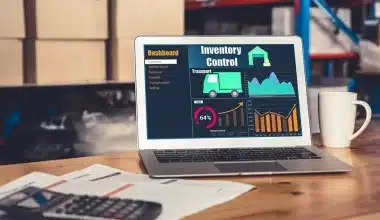Running a small business can be very stressful without the appropriate management systems. From managing products and services, assuring customer happiness, and, most importantly, ensuring that your clients pay you on time, you could really do with the help of a good billing system. In this guide, we have listed some of the best billing systems for your business, with tips on what to look out for when selecting one.
What is a Billing System?
Billing systems are software platforms that allow a business to track billable items and services. It is frequently included with other applications, such as accounting software, although it can also be provided as a stand-alone service.
Billing systems automate many repetitive billing operations in order to reduce manual tasks and increase efficiency. Depending on the cost structure, most applications will provide a variety of functionalities, such as:
- Employee time tracking for billing purposes
- Online invoicing (creation/delivery of templates)
- Creating personalized payment reminders and schedules
- Client project time tracking
- Payment processing using the internet (credit card, PayPal, ACH, multi-currency)
- Analytics and reporting, for example, cashflow, late payments, and expenses
Best Small Business Billing Systems
Now that we’ve established the basics, let’s take a look at some of the best small business billing systems available:
#1. Zoho Invoice
Zoho is an excellent choice for organizations with a limited budget for business software. Why? because it is a complimentary service. Zoho, in addition to being one of the best invoicing software applications, also provides project management and cost-tracking features. One of Zoho Invoice’s biggest features is the option to build a portal for each client with its own unique login, allowing you to exchange information with clients in full transparency.
#2. Quickbooks Online
Quickbooks is a cloud-based billing application that is ideal for organizations that need to access information on the go and sync data across devices. While it does allow you to make bespoke invoices, Quickbooks is more of an accounting program than an invoicing software. Quickbooks also offers a 60-day money-back guarantee, which is beneficial for firms that are hesitant about whether to commit.
#3. Xero
Xero is a billing and accounting solution that provides organizations with a plethora of native interfaces with business and financial systems. It provides some of the most sophisticated payment options available, including automated payment reminders to save important administrative time. However, because it is one of the more expensive payment alternatives, you must be certain that you will use the capabilities included in the higher-level plans.
#4. FreshBooks
FreshBooks is by far one of the market’s most popular billing systems, and it’s easy to see why. It is designed for quickly developing small businesses and has strong integrations with Stripe, Shopify, and PayPal, as well as a mobile app available on both Android and iOS. It allows you to log your time and expenses, invoice, and receive automated payment reminders. Businesses can also take advantage of a 30-day free trial.
#5. Invoice Ninja
Invoice Ninja has all of the main features that free invoice software should have, such as time tracking integration, the ability to request a deposit upfront from consumers, and the ability to add taxes and discounts to invoices. The commercial versions include extra important features such as bulk invoicing, but the free version is so powerful that you may never need to upgrade if you don’t have more than 20 clients.
#6. Hiveage
Hiveage stands out for its simplicity if you’re feeling overwhelmed by all of the features other software applications offer and all you need to do for your freelance business is send invoices and accept money. Creating one-time and regular invoices is simple, the dashboard is easy to use, and even the free edition includes time, expense, and mileage monitoring. Through Zapier, Hiveage can also be linked to accounting, CRM, and project management tools.
#7. Harvest
Harvest enables project team members to document their hours and expenses in great detail, frequently within the apps that project managers use. Managers can create a project budget and track spending and hours to ensure that teams are operating productively. Harvest’s estimate, invoice, and payment collection tools are simple to use, and it includes useful features like as automated email reminders to consumers.
#8. InvoiceOwl
This is a great billing system for small business owners and freelancers. It allows you to rapidly make professional and trendy invoices and get paid. The software handles the full billing process, from estimating through recording, generating sales tax, and reporting.
#9. Square Invoice
Square Invoices is a good billing system for small businesses as well. It’s a free invoice tool, and the only fees you’ll have to pay are processing fees if you take online payments as e-payments. It accepts cash and cheques and does not charge a monthly transaction fee.
Invoicing software also sends automatic payment reminders, ensuring that you get paid on time. The auto-reminder tools notify you of future due dates as well as delinquent invoices. In addition, Square invoicing allows you to track invoices in real time, and consumers can store their credit card information for convenient payment.
#10. Invoice2go
Invoice2go is another excellent piece of small business invoicing software. When compared to other free billing software, it is mostly used for making invoices, but it contains a plethora of additional accounting capabilities.
With this accounting software, you can create various invoices, estimations, and financial reports to keep you and your team on the same page. You can also accept Visa, MasterCard, and American Express payments through numerous payment gateways.
#11. Zipbooks
This program simplifies bookkeeping by providing professional and simple invoicing templates that allow you to quickly prepare estimates and invoices. It is simple to customize your invoices, and you can include your company logo and other necessary brand information.
ZipBooks’ free subscription allows you to send and track customer bills. The automated billing tool allows you to collect money more quickly and easily. ZipBooks also tracks accounts receivable, so you always know how much your clients owe you.
#12. Paypal
Paypal is a free invoice software that is mobile-friendly. On any digital device, you can create and send invoices in minutes, save online invoice templates for rapid entry, and manage payment reminders. Paypal is also known as a payment gateway because it accepts payments from clients all around the world and processes card and bank payments. With a plethora of simple tools at your disposal, sending a professional invoice is simple with Paypal. This free invoicing mobile software has been operating for almost 20 years!
#13. Nutcache
Nutcache is an invoicing and project-tracking software that is ideal for small enterprises. You may create, customize, and monitor an unlimited number of invoices, invoice your project, manage late payments, and be paid more quickly. If you have a reoccurring invoice, just automate it to ensure timely payment. Their free plan is limited to 20 users and 1 GB of storage.
Is There a Free Billing Software?
Most of the billing software options we listed in this guide have free packages. You can choose anyone that suits your needs.
How to Select The Best Billing Systems For Your Business
To help you decide which billing system is best for you, ask yourself these questions.
#1. Is it expandable?
Remember to consider the future as well as the present. Because most invoicing software bases pricing on the number of clients, business expansion may result in higher expenditures. Look for software that will support the business you intend to run in a year without forcing you to upgrade to a much higher price tier.
#2. Is it simple to use for you and your customers?
Most invoicing software providers provide free trials to prospective users. Use them to ensure you understand how to use the capabilities you require. Choose payment gateways that can handle your client’s needs, especially if you have clients from other countries and need to support numerous currencies. Take the time to evaluate the program from the client’s perspective as well.
#3. Does it work with the software you already have?
If you already use other tools, seek an invoicing solution that interfaces with them. Many of the choices on this list interact with other software through Zapier, which users must set up themselves. Before you commit to one application, make sure you test those integrations.
With the correct invoicing software, you may be able to condense some of your tasks into a single location. Consider switching from a time-tracking app to an invoicing software with native, or built-in, connectors that can suit those demands as well.
#4. What is the price?
Most invoicing software packages’ “freemium” concept can make cost projection difficult. Changes in your client base or employee levels may push you into a different price class. Furthermore, several crucial functions could be paid-for add-ons.
Why Is It Important To Choose The Best Billing Systems For Your Business?
Billing systems may appear to be a boring investment. However, it is one of the most crucial administrative decisions a business can make.
Why? Because the workflows you employ to arrange your professional bills, project management, and payment processing are determined by billing systems. Depending on the level of customization and automation provided by your billing and invoicing solution, this can have a significant impact on your company’s profitability.
Your billing software selection may have an impact on the following capabilities:
#1. Having all of your billing information in one location
If you have to utilize separate accounting and invoice software to manage your billing, it takes a lot longer to manage properly. Your employees will be continuously switching between interfaces to see and update information, such as accounts payable or expense tracking. This makes it difficult to acquire a clear picture of business activities and may result in late payments.
With an all-in-one billing system, you can view all key billing information in real-time on a single dashboard or even on the move via a mobile app. This assists you in streamlining your procedures and being proactive in recognizing potential billing concerns.
#2. Communications automation
For many small businesses, keeping track of invoices and accounts receivable is a full-time job. When you’re dealing with a large number of clients, it’s easy for communications like emails to go between the gaps.
You no longer need to spend hours per week chasing down clients if you use an automatic billing service. You can automate follow-ups by email or SMS, or you can pre-plan your calendar with phone calls to clients who have yet to answer. Also you also integrate unique URLs into customizable invoices to make the payment procedure as easy as possible for your clients; they will certainly appreciate it.
#3. Auditing is simple.
Unexpected audits for tax or legal reasons are an unavoidable part of doing business. But there’s nothing worse than having to gather financial data from different spreadsheets because you don’t have a system that can generate reports automatically.
This consumes valuable staff time and adds significant friction to business operations. However, it is completely avoidable with a solid billing software solution that makes audits simple and painless.
#4. Improved customer relationships
If a client does not receive confirmation that a payment has been received, he or she may become concerned that the payment has not been processed. Furthermore, not even a simple “thank you” is unlikely to strengthen consumer ties.
When your interactions with your clients are fluid and honest, you build trust and more profitable relationships because your clients feel at ease doing business with you. As a type of customer relationship management (CRM), billing software allows you to manage the client experience considerably more effectively. Customer churn can be reduced if clients always know where they stand.
#5. Excellent analytics
Excel spreadsheets are great for recording data, but they aren’t great for communicating insights. For example, if you wanted to know the average time it takes a client to pay an invoice (and whether there are repeat late payers), you’d have to spend a significant amount of time crunching figures, which isn’t an efficient use of staff time.
Does QuickBooks Have A Billing System?
Yes, QuickBooks has a billing system that allows you to accept many payment methods, making it easy for customers to pay you.
How Much Is QuickBooks Invoice?
The starting price for the QuickBooks invoice is $7.50, which increases to $15 after a 3-month period.
Is QuickBooks A One-Time Purchase?
QuickBooks payment is subscription-based. It is not a one-time purchase.
Is QuickBooks Difficult To Learn?
Learning to use QuickBooks is simple for someone who is familiar with accounting ideas and how accounting software works, but it might be difficult for someone who is technologically challenged or has no bookkeeping experience.
Is Square Invoice Free?
Yes, Square Invoice is a free billing software. It is among the best free options for a small business.
What are the different types of billing systems for small businesses?
There are several types of billing systems for small businesses, including cloud-based billing systems, which are hosted online and can be accessed from anywhere with an internet connection. Desktop-based billing systems: these systems are installed on a local computer or server. -Invoicing software: these systems are designed for creating and sending invoices. Payment processing software: these systems are designed for processing payments.
How much does a billing system for a small business cost?
The cost of a billing system for small businesses can vary depending on the features and functionality of the system, as well as the number of users. Some systems are offered on a monthly or annual subscription basis, while others are offered as a one-time purchase.
How do I set up a billing system for my small business?
Setting up a billing system for your small business typically involves choosing a system that meets your needs, purchasing and installing the software, and configuring the system to work with your existing systems and processes.
Can a billing system for small businesses integrate with other software?
Yes, most billing systems for small businesses offer some level of integration with other software, such as accounting software, CRM systems, and e-commerce platforms. This can help to streamline processes and improve efficiency.
Can a billing system for small business handle recurring billing?
Yes, a lot of small business billing systems come with tools for managing recurrent billing, like the ability to create recurring client subscriptions or invoices. By automating the invoicing process for recurring clients, businesses can save time and effort.
How can a billing system for small businesses improve cash flow?
By automating the billing process, issuing bills and reminders automatically, and monitoring payments, a billing system helps enhance cash flow. Additionally, it enables companies to examine their accounts in real-time and take the necessary actions.
In Conclusion,
With many options for billing systems available, choosing the right one for your business can be a major hassle. That’s why we have done the work by selecting the best options available for you. You can further your research to gain more clarity before making your choice.
Frequently Asked Questions
What are the three different types of billing systems?
The three different types of billing systems are open, closed, and isolated systems.
Is billing considered accounting?
Although the two terms are similar, they are not the same. Accounting is concerned with the recording, classification, and summarization of financial transactions. On the other hand, Billing is focused on providing invoices and collecting money.
What is the difference between a bill and an invoice?
An invoice comprises the money your clients owe you, but a bill is the money you owe your creditors.
{
“@context”: “https://schema.org”,
“@type”: “FAQPage”,
“mainEntity”: [
{
“@type”: “Question”,
“name”: “What are the three different types of billing systems?”,
“acceptedAnswer”: {
“@type”: “Answer”,
“text”: “
The three different types of billing systems are open, closed, and isolated systems.
“
}
}
, {
“@type”: “Question”,
“name”: “Is billing considered accounting?”,
“acceptedAnswer”: {
“@type”: “Answer”,
“text”: “
Although the two terms are similar, they are not the same. Accounting is concerned with the recording, classification, and summarization of financial transactions. On the other hand, Billing is focused on providing invoices and collecting money.
“
}
}
, {
“@type”: “Question”,
“name”: “What is the difference between a bill and an invoice?”,
“acceptedAnswer”: {
“@type”: “Answer”,
“text”: “
An invoice comprises the money your clients owe you, but a bill is the money you owe your creditors.
“
}
}
]
}
- OFFICE MANAGEMENT SYSTEM: Best Free and Paid Options In 2023
- WHAT IS A FINANCE CHARGE? Overview, How it Works, and How to Calculate
- Practice Management Software: Definition & Top Picks
- REVENUE MODELS: Meaning, Practical Examples, Types (Detailed Guide)
- QuickBooks Accountant: Basic Guide for Optimal Results (+ Quick Tools)






